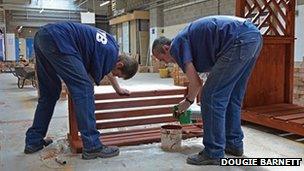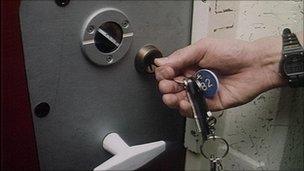Prisons inspector calls for more work in jails to 'cut reoffending'
- Published

The report said prisoners needed access to purposeful activities
Scotland's chief inspector of prisons has called for more offenders to be given meaningful work or education while they are serving their sentences.
In his annual report, external, Brigadier Hugh Munro said it would cut re-offending.
His comments came as figures showed, external more than 50% of those given short jail sentences reoffended within a year.
The Scottish government said new community payback orders, with offenders doing unpaid manual work, should further reduce reoffending.
Brig Munro has criticised the level of activity in Scotland's prisons in the past, and said things had yet to improve.
His report says: "If prisoners, including those untried or un-sentenced prisoners on remand, are not participating in purposeful activities during the day, there is much less likelihood of them being prepared for release back in to the community.
"If Scotland is to reduce re-offending, then prisoners need as much access to purposeful activities as possible."

Ministers said the reconviction figures showed short-term prison sentences did not work
Only 39% of prisoners in Dumfries and 40% in Kilmarnock Prison were out of house blocks during the day to get work training or education.
His report came as figures were published showing re-offending rates in Scotland have fallen to a 13-year low.
Some 30.1% of prisoners released in 2009-10 reoffended within a year - a fall of 1.4%.
But the one-year reconviction rate for those sentenced to a prison sentence of three months or less was 58.4%.
This compares to 23.9 per cent for those given a Community Service Order.
Justice Secretary Kenny MacAskill said: "What is again made clear by these statistics is that short-term prison sentences or three months or less simply don't work.
"Those released from a prison sentence of three months or less are reconvicted three times more often than those who get community service orders.
"It is clear that simply locking up these types of low level offenders is not the answer."
The Scottish government introduced community payback orders in February 2011 to allow low-level offenders to carry out unpaid manual work in their local area as an alternative to custody.
Officials say they are confident that when the scheme is reflected in figures in future years, they will show further reductions in reoffending.
- Published30 August 2011